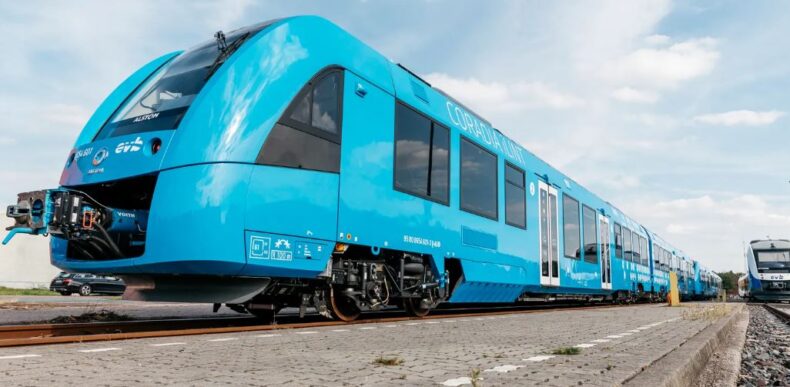Germany launched the world’s first hydrogen-powered train on Wednesday, unlocking the door for further environmentally friendly travel.
Germany will introduce the world’s first hydrogen-powered train on Wednesday. According to a report from CNN, with this plan, the government is unlocking the door for further environmentally friendly travel.
The report further stated, that the road in Bremervorde, Lower Saxony, will be purely served by 14 Coradia iLint trains, charged by fuel-cell propulsion technology. According to CNN, an agreement for 93 million euros has been signed between the railway’s holders, Landesnahverkehrsgesellschaft Niedersachsen, and Alstom, the manufacturers of these trains.
Henri Poupart-Lafarge, Alstom’s CEO, said, “Emission-free mobility is particularly the primary goal for providing a sustainable future.”
Five of these 14 trains made their appearance on Wednesday. They will gradually change the route’s 15 diesel trains by year’s end. Only one kilogram of hydrogen fuel is equal to an average of 4.5 kilograms of diesel fuel.
Germany’s Hydrogen-powered train:
These hydrogen-powered trains have ousted diesel trains on the 100km railway that links the cities of Cuxhaven, Bremerhaven, Bremervoerde, and Buxtehude close to Hamburg. The plan also includes the Elbe-Weser Railways and Transport Business, which will be managing and operating the trains, and the gas and engineering company Linde.
The trains release no pollution and generate a bit of noise, releasing only steam and evaporated water. They have a 1,000-kilometer range, which means they might run on the network for a whole day on a single tank of hydrogen, reported CNN.
A hydrogen filling station has so far been established along the road. The trains could reach speeds of up to 140 km/h. Regardless of current supply issues, it is a world premiere and a significant step forward for green rail transportation, according to Al-Jazeera.
Run For Its Money
Planned in the southern French city of Tribes and manufactured in Salzgitter in central Germany, Alstom’s trains, known as Coradia iLint, are trailblazers in the sector. According to Alstom, the plan generated jobs for 80 employees in the two countries.
Commercial trains have been implemented since the start of 2018 on the line with two hydrogen trains. However, today the whole fleet is accepting the innovative technology. The French company has signed four contracts for dozens of trains between Germany, France, and Italy, and there is no sign of a slowdown in demand.
Stefan Schrank, project manager at Alstom, told the AFP news agency, “In Germany, between 2,500 and 3,000 diesel trains could be changed by hydrogen models.”
According to Alexandre Charpentier, a rail master at consultancy Roland Berger, “By 2035, approximately 15 to 20 percent of the local European economy could operate on hydrogen.”













